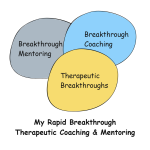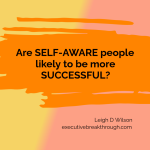Leigh D Wilson
Most of us want to make personal change at some point in our lives – we want to do something change in some way – the way we are or the way we live to improve our health or our wealth or our relationships or some other aspect of our life.
This is not often not so hard – we decide on the change we want to make and we make it.
Sometimes it’s a bit harder though. We might decide we want to get fit and embark on an exercise program but when it really comes to the crunch, do we really want to get off the couch and go out in the cold and exercise or would it be better to just stay where we are?
So these sort of conflicts occur and they occur at a conscious level – we can weigh it up and decide which is the better course of action and then solve the problem.
But other problems occur at an unconscious level, like the woman who wants to lose weight – she’s seriously overweight – but she wants to lose weight but isn’t aware that at a deep unconscious level she feels that she’ll be vulnerable and attract unwanted attention if she’s slimmer.
Or the smoker who wants to give up smoking but on an unconscious level really enjoys the social side of smoking and feels he’ll miss that if he gives that up.
Or the person that often gets sick or gets injured or is suffering from depression and anxiety who really wants to get over all these things but, at an unconscious level, really enjoys the attention and the love and the care that these things bring.
These are called ‘secondary gains’ and they occur at an unconscious level and can be very hard to deal with on a personal level, just by yourself, because they’re unconscious, which, of course, makes them hard for you to deal with.
In fact, they are better dealt with by working with an experienced and skilled practitioner.
So, if you’d like my help with any of these issues or if you think something like this might be holding you back in some way contact me on one of my links or direct message me and we can have a chat and we can see how I might be able to help you.
Thanks very much
Edited transcript







